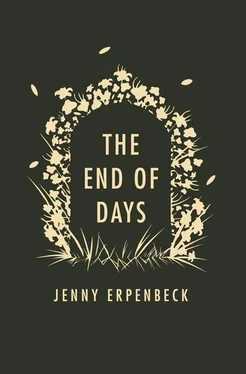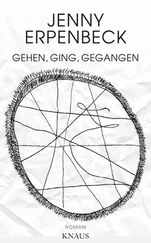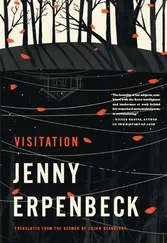Jenny Erpenbeck - The End of Days
Здесь есть возможность читать онлайн «Jenny Erpenbeck - The End of Days» весь текст электронной книги совершенно бесплатно (целиком полную версию без сокращений). В некоторых случаях можно слушать аудио, скачать через торрент в формате fb2 и присутствует краткое содержание. Год выпуска: 2014, Издательство: New Directions Publishing, Жанр: Современная проза, на английском языке. Описание произведения, (предисловие) а так же отзывы посетителей доступны на портале библиотеки ЛибКат.
- Название:The End of Days
- Автор:
- Издательство:New Directions Publishing
- Жанр:
- Год:2014
- ISBN:нет данных
- Рейтинг книги:4 / 5. Голосов: 1
-
Избранное:Добавить в избранное
- Отзывы:
-
Ваша оценка:
- 80
- 1
- 2
- 3
- 4
- 5
The End of Days: краткое содержание, описание и аннотация
Предлагаем к чтению аннотацию, описание, краткое содержание или предисловие (зависит от того, что написал сам автор книги «The End of Days»). Если вы не нашли необходимую информацию о книге — напишите в комментариях, мы постараемся отыскать её.
The End of Days — читать онлайн бесплатно полную книгу (весь текст) целиком
Ниже представлен текст книги, разбитый по страницам. Система сохранения места последней прочитанной страницы, позволяет с удобством читать онлайн бесплатно книгу «The End of Days», без необходимости каждый раз заново искать на чём Вы остановились. Поставьте закладку, и сможете в любой момент перейти на страницу, на которой закончили чтение.
Интервал:
Закладка:
22
Thank you, he says, and the man nods to him, but then others arrive wanting to shake the son’s hand, and by the time the line is finally at an end and the funeral director places his mother’s medals back in their proper boxes, handing them to him, and a soldier of the Guards Regiment places his mother’s books in a bag, carrying them away, and a gravedigger begins to fill up the pit again with pale Brandenburg sand, and one or another of his mother’s friends, their eyes filled with tears, strokes the son’s head one last time as they are leaving, by the time the group of mourners has finally dispersed and departed, the stranger is nowhere to be seen, and he, the sole survivor, the son of the deceased who has not yet even reached the age of maturity, takes streetcar No. 46 back to the house where he has lived until now together with his mother, and where there is now no one awaiting him.
Please take off your shoes in the hall. Walking through his invisible mother, he climbs the stairs, goes into his mother’s dressing room, takes the key from its secret hook, and unlocks the linen cabinet. Inside are duvet covers, pillowcases, towels, and sheets.
At the very bottom, under the sheets, is a sealed letter.
Russian stamps, a Vienna address in his mother’s handwriting, and above it a stamped message adorned with a swastika: Evacuated to the East.
At some point his mother slid this letter under the sheets.
Now he has retrieved it.
He looks at the envelope, turns it over, and on the back is an address in Cyrillic script.
He slides the letter back under the sheets.
But now the hiding place is no longer a hiding place.
Does she really not have a photograph of his father?
On the evening of this day he takes out the atlas from his mother’s bookshelf.
Where is Kharkov anyhow?
23
The next morning is Sunday.
The next morning his mother is still dead.
If only she would stop being dead soon, he thinks.
If only the stairs didn’t exist, his mother would still be alive, he thinks.
If only they hadn’t moved into this house with a staircase.
If only his mother hadn’t liked this house so much.
If only she hadn’t liked this place so much where she would break her neck.
Those stairs are treacherous.
In his mother’s atlas, still lying open on his table from the night before, he flips from the Ukrainian Soviet Republic, featuring the major city Kharkov, back to the page that shows Berlin. Scientific convention has assigned Berlin, this city where his mother was until recently still alive and where she is now dead, the coordinates 52.58373 degrees latitude north and 13.39667 degrees longitude east (coordinates that were assigned to this place before her death and remain assigned to it now). And since, after all, human beings can’t go strolling around on the moon and falling down dead there, it stands to reason that two of the coordinates in his atlas must be the coordinates of the place where he himself will stop living. Where his bones will rot. A place he doesn’t know yet — and by the time he does, it won’t do him any good.
Mama, does that mean that some day my body will be my corpse?
With all its birthmarks and scars, with the skin, hair, and veins I know so well already? Does that mean I’m basically sharing my entire life with my corpse? Is that how it is, Mama? You grow up, you get old, and when the corpse is ready, it’s time to die?
Since his mother is no longer winding the clock on the wall, it’s quieter in the house than ever.
So now in this world that has been surveyed to within an inch of its life, he is alone.
Alone.
Alone with shelves filled with books, cabinets containing drawers filled with files and notes; alone with chairs, beds, tables, sofas, cupboards, coat hooks and lamps; alone with the chandelier, with rugs, a rattan trunk, winter coats, with his mother’s typewriter; alone with bottle openers, aspirin, bed linens, scouring powder, tools, shoes, and pots, with ironing board, laundry rack, tea table, and the wall hanging with the huge yellow sun, with broom and mop, his mother’s combs, brushes, and makeup, with shower gel and skin creams, dishes, knives, and forks, flower vases, paper clips, envelopes, his mother’s diaries and manuscripts, records and a record player, eight bottles of wine, a music box, chains, rings, and brooches, two cans of lentils, a refrigerator containing half a stick of butter, three tubs of yogurt, two slices of cheese; he’s alone with a revolving chair, countless drawings and lithographs in varying formats, several paintings, one of them a portrait of his mother; alone with ten apples, a loaf of bread, with sundry pencils, pens, erasers, and stacks of white paper; alone with twine, coasters, potholders, with coins and bills from many lands, with mirrors, extension cords, and a tabletop fountain that no longer works; alone with two potted rubber trees, several coverlets, woolen blankets, pillows, with empty suitcases, handbags, house slippers, nutcrackers, tablecloths and carbon paper, towels, eyeglasses, sweaters, stockings and blouses, underwear; alone with his mother’s cardigans and scarves; alone with his own first sweater and cap from when he himself was still an infant, and a little cutting board he painted back in kindergarten in Moscow.
Alone.
Will he have to pick up her glasses to remember her eyes, her wallet to remember her fingers, a pair of shoes to see her feet eternally in their shoes, and her woolen blanket to remember until the end of days how her body looked when she was napping after lunch? How many objects and coverings will be needed if she is to retain at least a life of memory inside him? But probably there isn’t anything his mother’s hands, reaching out from the realm of the dead, will be able to grasp so firmly — no object, no piece of furniture, or item of clothing — as she grasps him, the one to whom she first bequeathed her heartbeat, and then, when he was still small, whose diapers she changed and whose nose she wiped, whom she looked at again and again, watching and observing him, and whom later, as he grew, she taught language and read to, whose hand she held to cross larger streets, whose hair she combed, whose sweater she pulled on over his head and whose shoes she tied, whom she looked at again and again, watching and observing him, whom she consoled when he fell down, whose temperature she took and whom she taught to ride a bicycle, to whom she said what she found good and proper and what wrong, what she found tedious, amusing, interesting, whom she looked at again and again, watching and observing him, whom she scolded, shouted at and cursed, and often also praised and kissed. For the first time now, he tries to see himself through his mother’s eyes, from the outside, as it were, but this is difficult. Strange, he thinks, that we use blind spot to designate a place that cannot clearly be seen because it is too close. Still, memory no doubt prefers to be able to exchange the bit of blindness for a living body.
During spring break he’ll start cleaning out the house, and in the summer he’s supposed to move to a Home where he’ll spend the final year before he comes of age, his legal guardian told him.
When the doorbell rings, he knows that on a Sunday it can be neither the mailman nor the housekeeper.
The man looks at him with his own gray-blue eyes, and the mouth of the man looks exactly like his own mouth that he sees every morning in the mirror. With exactly the same sort of raspy voice he himself has, the man, after clearing his throat, says good day in Russian.
In the pause that follows, German silence and Russian silence intermingle.
And then the boy’s father grabs him by his shock of hair and pulls him in for a hug.
Читать дальшеИнтервал:
Закладка:
Похожие книги на «The End of Days»
Представляем Вашему вниманию похожие книги на «The End of Days» списком для выбора. Мы отобрали схожую по названию и смыслу литературу в надежде предоставить читателям больше вариантов отыскать новые, интересные, ещё непрочитанные произведения.
Обсуждение, отзывы о книге «The End of Days» и просто собственные мнения читателей. Оставьте ваши комментарии, напишите, что Вы думаете о произведении, его смысле или главных героях. Укажите что конкретно понравилось, а что нет, и почему Вы так считаете.












